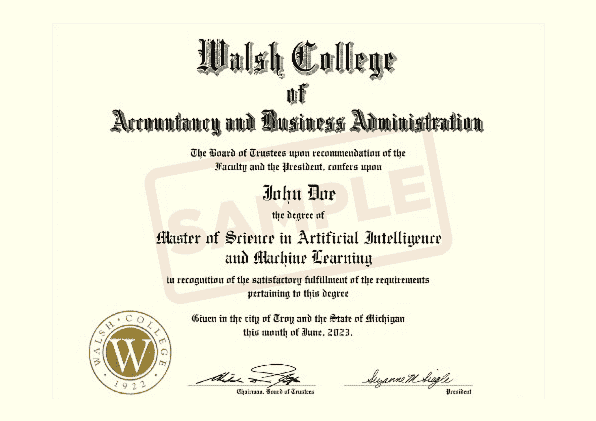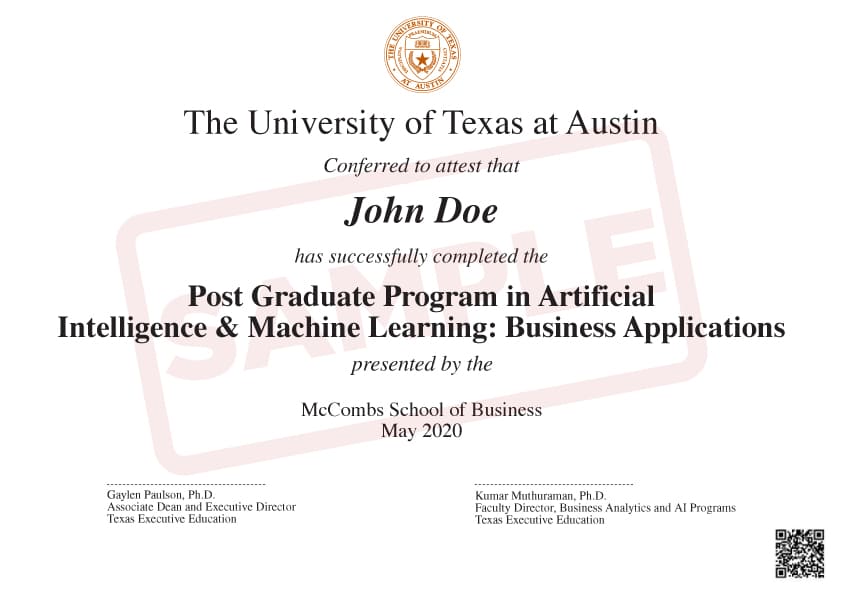Learn more about the course
Get details on syllabus, projects, tools, and more
Sorry, this content is currently not available
in your region
Continue to check out similar courses available to you
EXPLORE COURSES
Doctor Of Business Administration in Artificial Intelligence and Machine Learning
Application closes 5th Nov 2025
What's new?
-

Build expertise in Generative AI
Dive deep into cutting-edge Generative AI concepts, leveraging tools like ChatGPT and Hugging Face Transformers library to access LLMs for text generation, summarization, and other advanced applications.
-

Modules on MLOps and Multimodal AI
With our Artificial Intelligence course, master MLOps for seamless model deployment alongwith Multimodel AI to integrate and process diverse data types effectively
Program Outcomes
Transform business and drive growth with AI
Drive business transformation as a strategic AI leader
-
Gain strategic insights to manage and execute AI projects effectively
-
Build innovative AI-powered products and services to drive growth
-
Boost your career with a globally recognized credentials
-
Demonstrate mastery and earn the title of 'Dr.'
Earn Doctoral and Master's Degrees from the World's Leading Institution
Key program highlights
Why choose the DBA in AI & ML program
-

Top ranked DBA by Forbes
Ranked among top 10 online DBA degrees of 2024 by Forbes for academic quality and industry relevance.
-

Hands-on projects followed by thesis
Work on numerous real world projects followed by capstone projects and a final dissertation with dedicated guidance from top faculty and industry experts.
-

WES recognized and HLC accredited
Ensures global acceptance and enhances career and academic opportunities.
-

Alumni status from Walsh College
Earn alumni status from Walsh College upon program completion.
-

Expert mentorship and support
Interact with AI experts for guidance on completing and showcasing your projects, while receiving 1:1 personal assistance, weekly concept reinforcement sessions, and dedicated support from a program manager for any queries.
-

Added Modules on Generative AI and Prompt Engineering
Gain practical knowledge of transformer architectures, Retrieval-Augmented Generation (RAG), and prompt engineering to build effective NLP solutions using open-source LLMs.
-

A cohort of experienced leaders
40% of participants are senior-level professionals, and 60% are in leadership roles, bringing diverse expertise and strategic insights.
-

Powerful Global Network
Connect with peers from Amazon, Microsoft, JPMorgan, and others. Unlock top-tier career opportunities beyond the classroom.
*The list of companies is indicative and may vary based on cohorts
Skills you will learn
Generative AI
Prompt Engineering
Machine Learning
Research Methodology
Academic Writing & Publication
Deep Learning
Neural Networks
Business Intelligence Using AI
AGENTIC AI
AI Strategy & Ethics
Large Language Model
Natural Language Processing
Retrieval-Augmented Generation
AI Business Application
Generative AI
Prompt Engineering
Machine Learning
Research Methodology
Academic Writing & Publication
Deep Learning
Neural Networks
Business Intelligence Using AI
AGENTIC AI
AI Strategy & Ethics
Large Language Model
Natural Language Processing
Retrieval-Augmented Generation
AI Business Application
view more
Careers after a DBA in AI and ML
Top career roles for DBA graduates
Here are high-impact roles typically pursued by DBA in AI and ML graduates:
-
Chief AI officer
-
Director – AI strategy
-
AI/ML Solutions architect
-
Senior data scientist
-
Head of AI/ML research
-
AI and ML consultant
- Overview
- Career Transitions
- Why GL
- Learning Journey
- Curriculum
- Projects
- Tools
- Certificate
- Faculty
- Reviews
- Career support
- Fees
- FAQ

This program is ideal for
The DBA in AI & ML is designed to empower working professionals and senior leaders to drive innovation, lead transformation, and create research-backed business impact
View Batch Profile
-
Senior professionals
Elevate your career with advanced leadership skills, applied research capabilities, and AI-driven business strategies
-
Domain experts and functional Leaders
Integrate AI/ML into functional areas like marketing, finance, operations, and HR to solve complex business problems
-
CXOs and business heads
Strengthen your strategic edge and guide your organization’s AI transformation with global insights and doctoral-level expertise
-
Technology leaders
Lead AI initiatives and innovation teams with a deep understanding of technical architectures and their business impact
Experience a unique learning journey
Our pedagogy is designed to ensure career growth and transformation
-
Learn with self-paced videos
Learn critical concepts from video lectures by faculty & AI experts
-
Engage with your mentors
Clarify your doubts and gain practical skills during the weekend mentorship sessions
-
Work on hands-on projects
Work on projects to apply the concepts & tools learnt in the module
-
Get personalized assistance
Our dedicated program managers will support you whenever you need
Ready to take the next step?

-

Explore a sample course from our faculty
-

Know more about the case-studies & projects
-

Experience a sample mentorship session with an industry expert
Application closes in:
1
Days
1
7
Hrs
4
0
Mins
3
5
Secs

-

Get a detailed program overview
-

Understand how this program can help achieve your career goals
-

Get more information about the admission process & next steps
50,000+ learners found this helpful
Curriculum
-
225+ hrs
learning content
-
10+
languages & tools
Year: 1
Python & Gen AI Prep-Work
This course equips beginners with Python basics, laying the foundation for AI and ML. It also covers Generative AI concepts, including ChatGPT and other AI tools, with practical demonstrations of their business applications.
Python Bootcamp for Non Programmers
This course is a training module for learners with limited or no programming exposure. It enables them to be at par with learners with prior programming knowledge before the program commences.
Overview of Python
Fundamentals of Python Programming
Overview of Numpy and Pandas
Overview of Visualization in Python
Overview of Data Preprocessing in Python
Python Prep Work
This course provides you with a fundamental understanding of the basics of Python programming and builds a strong foundation of the basics of coding to build AI and Machine Learning (ML) applications
Introduction to Python Programming
AI Application Case Study
Generative AI Prep Work
This course provides you with an overview of Generative AI, what ChatGPT is and how it works, business applications of ChatGPT, and an overview of other generative AI models/tools via demonstrations
ChatGPT and Generative AI - Overview
ChatGPT - Applications and Business
Generative AI Demonstrations
Course 1: Introduction to Python
This course guides you to read, explore, manipulate, and visualize data to tell stories, solve business problems, and deliver actionable insights and business recommendations by performing exploratory data analysis using some of the most widely used Python packages.
Python Programming
Variables and Data Types
Data Structures
Conditional and Looping Statements
Functions
Python for Data Science
NumPy Arrays and Functions
Creating, Accessing and modifying NumPy arrays
Saving and loading NumPy arrays
Creating, Accessing and modifying Pandas Series
Pandas DataFrames
Creating ,Accessing and modifying, Combining DataFrames
Pandas Functions
Various data manipulation functions in Pandas
Saving and Loading Datasets using Pandas
Saving DataFrames to CSV, Excel, etc.
Loading datasets into DataFrames
Exploratory Data Analysis (EDA)
Data Overview
General statistics of the dataset (e.g., describe(), info())
Univariate analysis (Histogram, Boxplots, and Bar graphs)
Bivariate/Multivariate Analysis((Line Plot, Scatterplot, Lmplot, Jointplot, Violin Plot, Striplot, Swarmplot, Catplot, Pairplot, Heatmap)
Customizing of Plots
Missing value treatment,
Outlier detection and treatment
Analyzing Text Data
Text Processing
Stopword removal
Stemming
Removing special characters and whitespace
Text Vectorization(Bag of Words,n-grams)
Course 2: Machine Learning
Linear Regression Introduction to learning from data Types of machine learning Business Problem and Solution Space Regression, Correlation and Linear Relationships Simple and Multiple Linear Regression Categorical Variables in Linear Regression Regression Metrics Decision Trees Business Problem and Solution Space - Classification Introduction to Decision Trees Impurity Measures and Splitting Criteria Classification Metrics Pruning Decision Trees for Regression K-means Clustering Business Problem and Solution Space - Clustering Distance Metrics Introduction to Clustering Types of Clustering, K-means Clustering t-SNE for visualizing high-dimensional dataThis course helps you build an understanding of the concept of learning from data, build linear and non-linear models to capture the relationships between attributes and a known outcome, and discover patterns in and segment data with no labels.
Course 3: Advanced Machine Learning
This course helps you explore how to combine the decisions from multiple models using ensemble techniques to improve model performance and make better predictions, and employ feature engineering techniques and hyperparameter tuning to arrive at generalized, robust models to optimize associated business costs.
Bagging
Introduction to Ensemble Techniques
Introduction to Bagging
Sampling with Replacement,
Introduction to Random Forest
Boosting
Introduction to Boosting
Boosting Algorithms (Adaboost, Gradient Boost, XGBoost)
Stacking
Model Tuning
Feature Engineering
Cross-validation
Oversampling and Undersampling,
Model Tuning and Performance
Hyperparameter Tuning
Grid Search
Random Search
Regularization
Course 4: Introduction to Neural Networks
This course helps you implement neural networks to synthesize knowledge from data, demonstrate an understanding of different optimization algorithms and regularization techniques, and evaluate the factors that contribute to improving performance to build generalized and robust neural network models to solve business problems
Introduction to Neural Networks
Deep Learning and history
Multi-layer perceptron
Types of Activation functions,
Training a neural network
Backpropagation
Optimizing Neural Networks
Optimizers and their types
Weight Initialization and its techniques
Regularizations and its techniques,
Types of neural networks
Course 5: Natural Language Processing with Generative AI
This course will help you get introduced to the world of natural language processing, gain a practical understanding of text embedding methods, gain a practical understanding of the working of different transformer architectures that lie at the core of large language models (LLMs), explore how retrieval augmented generation (RAG) integrates information retrieval to improve the accuracy and relevance of responses from an LLM, and design and implement robust NLP solutions using open-source LLMs combined with prompt engineering techniques.
Word Embeddings
Introduction to NLP
History of NLP
Sentiment Analysis
Introduction to Word Embeddings
Word2Ve
, GloVe
Semantic Search
Attention Mechanism and Transformers
Introduction to Transformers
Components of a Transformer
Different Transformer Architectures
Applications of Transformers
Large Language Models and Prompt Engineering
Introduction to LLMs
Working of LLMs
Applications of LLMs
Introduction to Prompt Engineering
Strategies for Devising Prompts
Retrieval Augmented Generation
Introduction to Embeddings and Tokenization.
Byte-pair encoding (BPE) Tokenization
Computation and Application of Sentence Embeddings
Retrieval-Augmented Generation (RAG)
Course 6: Introduction to Computer Vision
This course will introduce you to the world of computer vision, demonstrate an understanding of image processing and different methods to extract informative features from images, build convolutional neural networks (CNNs) to unearth hidden patterns in image data, and leverage common CNN architectures to solve image classification problems.
Image Processing
Overview of Computer Vision
Color pixel and image representation
Edge Detection
Kernels
Padding, Strides and Pooling
Flattening to a 1D Array
Convolutional Neural Networks
ANN Vs CNN
CNN Architecture
Introduction to Transfer Learning
Common CNN Architectures
Course 7: Model Deployment
This course will help you comprehend the role of model deployment in realizing the value of an ML model and how to build and deploy an application using Python.
Introduction to Model Deployment
Introduction to Model Deployment,
Serialization
Deployment using Streamlit
Containerization
Introduction to Containerization
Docker
Deployment using Flask
Advanced Courses
- Introduction to Data Science
- Data Visualization and Predictive Modeling
- Mathematics of Artificial Intelligence and Machine Learning
- Data Storage Technologies
- Capstone Project
Year: 2 & 3
Term 1
INTRODUCTION TO DATA SCIENCE: Data is a core asset of organizations in all domains. Managing data and extracting actionable results is key to business survival and success. This course introduces the students to the field of data science. It provides an interdisciplinary overview of the various domains integrated into data science including business acumen, quantitative analysis, data storage and retrieval technologies, visualization and presentation methodologies. Upon successful completion of this course, you will be able to:
DATA STORAGE TECHNOLOGIES:
Database storage technologies have transformed into complex systems that support knowledge management and decision support systems. This course takes a look at the foundations of database storage technologies. Students will learn about database storage architecture, types of database storage systems (legacy, current and emerging), physical data storage, transaction management, database storage APIs, data warehousing, governance and big data systems. The student will tie this all together to see how database storage technologies apply to data analytics.
Upon successful completion of this course, you will be able to:
- Evaluate database storage technologies.
- Compare different database storage technologies used in data analytics.
- Investigate types of database storage technology systems (legacy, current and emerging).
- Assess database storage technologies solutions through hands-on lab assignments.
Term 2
DATA VISUALIZATION AND PREDICTIVE MODELING:
The goal of this course is to expose students to visual representation methods and techniques that enhance the understanding of complex data. Students will learn how to take raw data, extract meaningful information, use statistical tools and make visualizations to improve comprehension, communication and decision-making.
Upon successful completion of this course, you will be able to:
- Evaluate the key techniques and theory used in data visualization.
- Apply appropriate data visualization methods to different types of data.
- Explain how data visualization fits into the predictive analytic process.
- Build and evaluate visualization systems.
MATHEMATICS OF ARTIFICIAL INTELLIGENCE AND DEEP LEARNING:
This course presents critical mathematical concepts used in Artificial Intelligence and deep learning. The course focuses on linear algebra and analytic geometry for AI.
- Upon successful completion of this course, you will be able to:
- Understand linear algebra, matrices and vector spaces.
- Be introduced to linear independence and mappings.
- Understand and review analytic geometry.
- Understand norms, inner products and angles/orthogonality.
- Review orthogonal complement and projections.
Term 3
CAPSTONE PROJECT:
The Capstone Project provides the opportunity for integrating program learning within a project framework. Each student identifies or defines a professionally relevant need to be addressed that represents an opportunity to assimilate, integrate or extend learning derived through the program. The student will work with the Capstone Project Mentor to develop a proposal. After review and approval by the Capstone Project Mentor, the student will be authorized to complete the project.The student will present the completed project at the end of the semester.Upon successful completion of this course, you will be able to:
- Demonstrate the knowledge gained from the previous courses in the program.
- Write a formal research paper or conduct a detailed project.
- Apply the objectives of research to a practical information technology problem.
- Create a project plan to successfully present a solution/goal to the stated problem.
- Use research tools for an applied research paper or project.
- Evaluate the validity and reliability of statistics and other forms of research.
Research Methods
Introduction And Scope : This course focuses on the design of research by examining methods of collection, processing, analysis, and interpretation of data. Survey selection, instrumentation design, pilot testing, and analysis will also be discussed with specific attention paid to the reliability and validity of instruments. The course will present an array of techniques used by leaders to make organizational decisions with an emphasis on interpreting analytical results.By the conclusion of this class, you will gain a solid foundation regarding the various research designs along with their theoretical and applied constructs. This will allow you to prepare a problem for research as well as structure a valid research design for conducting the actual research itself (e.g., your doctoral dissertation).
Term 4
Qualitative And Exploratory Research Methods (712)
This course explores non-statistical forecasting and other qualitative research methods. Qualitative research methodologies have become more prevalent in research as a viable and valid form of inquiry, especially as they pertain to human behavior in organizations. Qualitative research techniques examined include ethno methodology; grounded theory; and phenomenological research. Nonparametric statistical analysis will also be examined. By the conclusion of this class, you will gain a solid foundation regarding the qualitative research approach and its various traditions along with their theoretical and applied constructs. This will allow you to prepare a qualitative problem for research as well as structure a valid qualitative research design for conducting the actual research itself (i.e., your doctoral dissertation or future research problems in your area of interest or specialization).
Quantitative Research Methods I (713)
Data Management And Non-Experimental: This course is a combination of quantitative research methods, multivariate statistics, and forecasting. The course assumes the doctoral student has had a graduate level statistics/quantitative methods course covering parametric statistics and hypothesis testing.
DOCTORAL RESIDENCY I This course is the first of three residencies. The residencies occur simultaneously with coursework throughout the student's doctoral journey. The intent of a residency experience is to provide students with a chance to connect directly with faculty/mentor and fellow students within the doctoral program. Students will attend information sessions, meet with faculty/mentor regarding subject matter and research methodology experts, and present their problem/purpose statement to a review board for feedback and direction.Outcome: Finalisation of project problem and purpose statements.
Year 3
Doctoral Residency II: Transition from coursework to dissertation research. Develop your dissertation proposal, gain ethical research approval, and begin collecting data for your study.
- Doctoral Residency III: Advance your dissertation research and writing. Analyze your data, draft your dissertation chapters, and receive ongoing feedback from your dissertation committee.
DISSERTATION COURSES
This dissertation program provides the structure and resources to complete your doctoral research and successfully defend your thesis.
- Dissertation I - Chapter 1: Develop a strong foundation for your dissertation. Learn to write a compelling introduction, craft a clear research question, and define your methodology.
- Dissertation II - Chapter 2: Understand the literature review. Explore relevant research, identify theoretical frameworks, and demonstrate your understanding of the existing scholarship.
- Dissertation III - Chapter 3: Focus on your research methodology. Refine your data collection plan, discuss data analysis techniques, and ensure ethical research practices.
- Dissertation IV- Chapter 4: Analyze your research data. Learn to interpret findings, draw conclusions, and identify potential limitations.
- Dissertation V - Chapter 5: Write your discussion and conclusion. Integrate your findings with existing literature, discuss the study's significance, and outline future research directions.
Master in-demand AI & ML tools
Get AI training with 27+ tools to enhance your workflow, optimize models, and build AI solutions
Meet your faculty
Get industry ready with dedicated career support
-
1:1 mentorship from industry experts
Get 1:1 career mentorship from our industry experts to prepare for jobs in AI and ML
-
Interview prep with experts
Participate in mock interviews and access our tips & hacks on the latest interview questions of top companies
-
Resume & profile review
Get your resume/cv and LinkedIn profile reviewed by our experts to highlight your AI & ML skills & projects
-
Access to Great Learning Job Board
Apply directly to top opportunities from leading companies with Great Learning Job Board
Course fees
The course fee is 12,550 USD
Invest in your career
-

Gain global recognition with HLC accreditation and WES recognition
-

Earn alumni status from Walsh College upon program completion
-

Master AI & ML to solve complex, data-driven business problems
-

Earn a ‘Dr.’ title & get recognised as a specialist in your field
Application process
Our admissions close once the requisite number of participants enroll for the upcoming batch . Apply early to secure your seats.
-

1. Fill the application form
Apply by filling a simple online application form.
-

2. Interview Process
Go through a screening call with the Admission Director’s office.
-

3. Join program
An offer letter will be rolled out to the select few candidates. Secure your seat by paying the admission fee.
Eligibility
- Applicants must hold a 3 or 4-year bachelor’s degree or equivalent in any discipline with a minimum of 60% marks from a UGC-recognized university or institution. The medium of instruction must be in English.
- No GRE/GMAT or any English proficiency test scores are required.
Batch start date
-
Online · To be announced
Admissions Open
Frequently asked questions
What is the difference between a Doctor of BA and a Doctorate?
The DBA program is different from the PhD. It is designed specifically for working professionals and develops data-driven, scientific, evidence-based decision-making skills. These decisions may be related to strategy formulation, implementation, operations, etc.
What is the value added to a DBA compared to a standard PhD?
In contrast, the PhD in Business Administration is designed for young academic-oriented learners. The PhD develops research skills that help to develop theories or models that enrich the existing literature.
Is this DBA degree globally recognized?
Yes. Walsh College is recognized by the World Education Services (WES). Students can showcase their educational accomplishments with a verified report from WES, which is accepted and respected by licensing boards, academic institutions, and employers throughout the US and Canada.
Is the Masters Degree and Doctorate WES approved?
Yes. Walsh College is recognized by the World Education Services (WES). Students can showcase their educational accomplishments with a verified WES report that is accepted and respected by licensing boards, academic institutions, and employers throughout the US and Canada.
How is Walsh DBA better in comparison to the competition? What are the USPs of the university?
#1 Ranking for Best Online DBA Programs by Forbes; Awarded Top-Tier Global DBA Ranking by CEO Magazine; WES recognized; Accredited by The Higher Learning Commission (HLC), a regional accreditation agency recognized by the U.S. Department of Education.
Be part of an elite network of industry leaders
- A cohort of experienced leaders
40% of participants are senior-level professionals, and 60% are in leadership roles, bringing diverse expertise and strategic insights. - Top-tier industry representation
Leaders from technology, finance, healthcare, manufacturing, and consulting contribute to a rich knowledge exchange. - Connect with global powerhouses
Our learners are making an impact at Amazon, Microsoft, Goldman Sachs, JPMorgan, Walmart, and more*, creating invaluable networking opportunities that extend beyond the classroom.
More than education, this is your gateway to top-tier career opportunities.
*The list of companies is indicative and may vary based on cohorts.



 Speak with our expert
Speak with our expert






















.jpg)







.jpg)



































